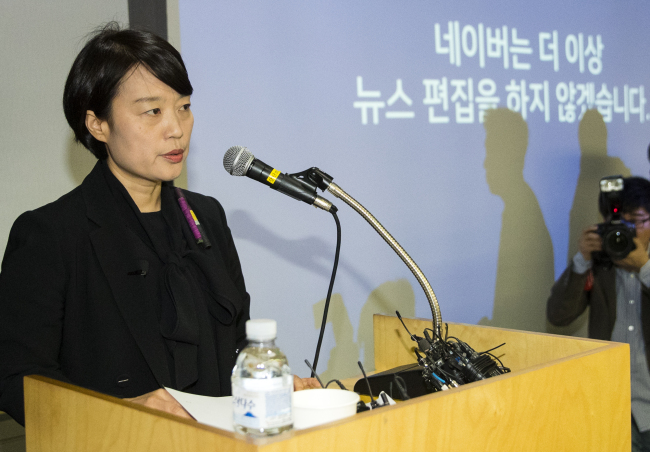Naver, the operator of South Korea’s largest portal website and search engine, announced on Wednesday a set of measures to prevent a repeat of the latest opinion-rigging scandal, including relinquishing its authority to edit news headlines and removal of a news list on the mobile front page.
Naver CEO Han Seong-sook said, “Naver will no longer engage in editing news from the third quarter,” at a press conference held in southern Seoul.
Such a decision has been made in the wake of a developing political controversy that was sparked by a revelation that a power blogger named “Druking” and former members of the ruling party had used a computer program that uses borrowed IDs to artificially ramp up the number of clicks on “agree” on comments on particular articles to sway public opinion.
Naver will come up with measures to let media outlets edit their news and provide advertising profits and readers’ data for them, Han said.
 |
Naver CEO Han Seong-sook speaks during a press conference held at Naver Partner Square in Gangnam-gu, southern Seoul on Wednesday. (Yonhap) |
Most of the measures, however, are limited to the portal’s mobile app version and not the PC version. Naver also maintained a lukewarm attitude towards transforming into an outlink system similar to that of Google by holding onto the news edit page and comments function of the portal, raising skepticism from critics whether the latest measures would bring fundamental autonomy of online news distribution by the press.
According to Han, on the front page of Naver’s mobile app, the operator will remove the lists of news and popular search keywords on a judgment that the lists capture first-sight attention from users.
And the main page will be re-embellished with a focus on the search box.
“The measure is to prevent excessive attention to particular articles placed on the front page,” the company said.
A new news board, temporarily dubbed “News Pan,” will be placed on the second page of the mobile app, which will be operated by each media outlet to provide a variety of opinions and views that are unedited by Naver.
Naver also decided to partially introduce an outlink system through discussions with individual media outlets.
The outlink system refers to making a link point to another website with the clicking of a news headline exposed to the portal.
Local media companies have been demanding the portal operator to establish the outlink system.
“It will be difficult to fully implement the system, but I agree to the principle,” Han said. “We will discuss the system with individual media outlets.”
Naver also decided to hand over authority to the mediums in managing comments from readers about their news articles.
Instead, the portal operator will reinforce its 24-hour monitoring system against macro programs and user patterns to stave off similar opinion rigging incidents, it said.
Such measures come amid continuing criticism of Naver for its insufficient restrictions for the online news comment system after the recent scandal involving politics.
Naver has capped the number of times a user can click “agree” or “disagree” on a comment at 50 times within a 24-hour timeframe.
The number of comments that a user can write on an article per day is now capped at three, down from 20.
Moreover, users who write a comment must wait 60 seconds before posting another comment, compared to the previous 10-second limit.
Despite the restrictions, opposition lawmakers staged a protest in front of Naver’s headquarters last month to demand a formal investigation into the firm for its part in creating and controlling a news dispersal system that they said can be manipulated to sway public opinion.
By Song Su-hyun (
song@heraldcorp.com)








![[Today’s K-pop] Blackpink’s Jennie, Lisa invited to Coachella as solo acts](http://res.heraldm.com/phpwas/restmb_idxmake.php?idx=644&simg=/content/image/2024/11/21/20241121050099_0.jpg)